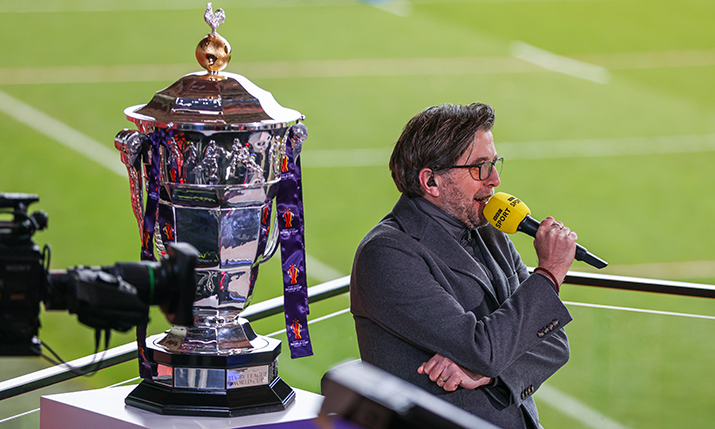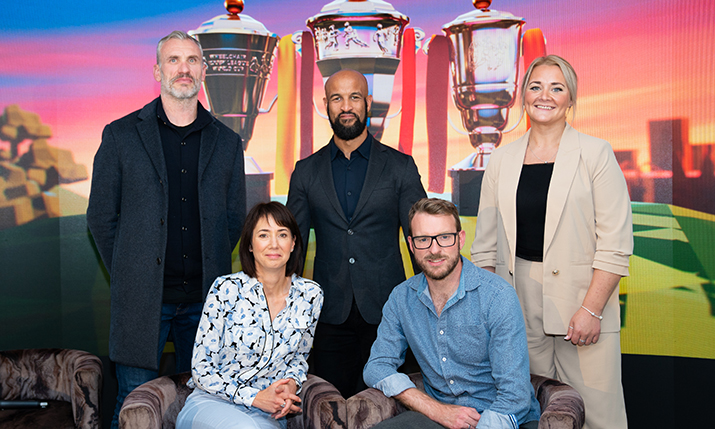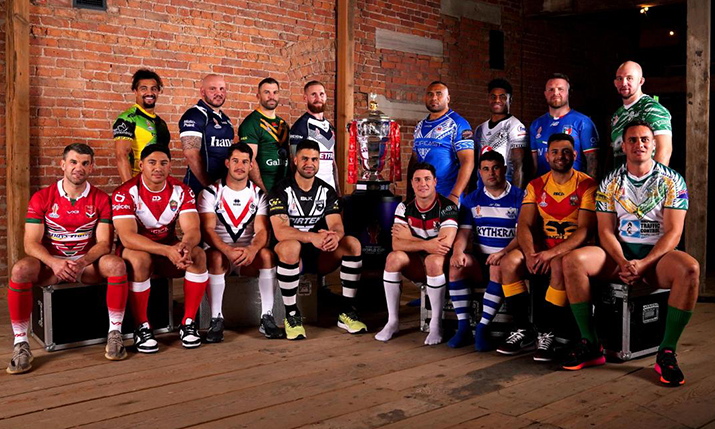On-pitch RF cameras and flash interviews added as BBC Sport aims to bring Rugby League World Cup viewers closer to the action

In the second of our interviews with the two host broadcasters for the Rugby League World Cup (RLWC) 2021, SVG Europe gets the lowdown from BBC Sport executive producer Sally Richardson on how the corporation will cover the matches for both a global and domestic audience, and the challenges that the event poses.
Delayed due to the pandemic, the 16th edition of the RLWC, which is being hosted in England, will see three competitions played out in parallel for the first time with the best men’s, women’s and wheelchair nations all battling it out for the biggest prizes in the sport.
Kicking off Saturday 15 October with England vs Samoa in the men’s tournament, the host broadcast duties for RLWC are being shared by BBC Sport and Whisper, with the former doing 16 of the 61 matches, including both the men’s and women’s finals.
The BBC is also the domestic rights holder for the tournament and will show all of the games live in the UK, with some on the main network channels, and some streamed.
Its output is extensive. So, although it is only doing a quarter of all the matches as host, it is actively producing television content and/or doing presentation for 39 of them over the nigh-on five weeks of the tournament.
“We’ll also have RF cameras that will actually be going onto the pitch after tries have been scored, and bring players back from where the points have been scored. This is something that is rarely seen in other sports.”
This is not an insignificant task, as BBC Sport’s RLWC executive producer Sally Richardson explains.
“With that volume, the challenge is having sufficient human and technical resources to be able to to cover all of it. Covering sixteen matches as a host broadcaster is reasonably simple. When you add the presentation side to that it brings extra pressure and requires a lot of extra resources and it is all being administered and arranged logistically by a small team.”
With some of the matches being doubleheaders, there are plenty of those logistical headaches too. And scheduling of the three competitions also poses a challenge.
“Unlike most major tournaments,” continues Richardson, “which start off with a very busy group stage [and then ease off into the knock out stages], this tournament begins with the men’s tournament and then the women’s and wheelchair matches start halfway through. It means that the pressure ramps up as the tournament progresses.
“Week four [of the tournament] looks ridiculous. We dare not look at week four at the moment, ” she says, presumably only half in jest.

Although the timeframe is tight, the BBC is still being ambitious with its planned coverage, both for the world feed and for its domestic output.
A serious line-up of pundits has been assembled including England’s most capped player James Graham, former Great Britain and England forwards Jamie Peacock, Jon Wilkin and Jamie Jones-Buchanan, the former England Women internationals Danika Priim and Lois Forsell, and former Great Britain coach Brian Noble.
Alongside the BBC’s lead rugby league commentator Dave Woods will be Matt Newsum and Sharon Shortle, Andrew Voss, Mark Wilson and Andy Stevenson.
And they all have a crucial role to play.
Rugby league is a very fast sport with very few stoppages. That is one of its many appeals. But with little time for a match director to tell the story of the game while it is being played, more of the pressure to explain what is happening, therefore, passes to the commentary and punditry team.
That is doubly so with a major tournament, with ‘World Cup’ in the name, where the audience will differ from a domestic match, with far more casual viewers. Ensuring that the lay fan understands what is happening without alienating the regular spectator is a tricky balance.
“Our commentary team are very good at explaining the game to both sides of the audience,” says Richardson.
“Rugby League is a forward-thinking game and when we look to them for innovation, we are pushing against a door that is already ajar. It’s a sport where we can take the viewer closer to the action than in any other sport.”
“On one side, to the die-hard rugby league fans who know exactly what they’re watching, and do not want to be patronised by being told what it is that they’re watching. And on the other side to the people we are trying to encourage to come to the sport and stay with it.
“[The latter] are viewers who watch something because it’s got World Cup attached to it, or they’re watching it because of the badge that’s on the chest, and they want to support their team. We have to educate those people and make them feel included, and encourage them to come back.”
Having referees mic’d up for TV really helps with that education process too, she adds.
“Rugby League referees are very good in their explanation to the players as to what is happening. Their signals are clear and easy to understand. If the on-field referee calls in the video referee, for example, if he’s unsure or unsighted, or he refers a try up to the video referee, he will always say what that is for and we will hear the video referee talk through it. And then there’s a big screen in the stadium which will provide the decision [for viewers and fans]. It’s really simple but really effective.”

For capturing the action, atmosphere and reactions, there are a couple of specialist cameras being put in place for this tournament. A Spidercam will be used on the big games as will a BatCam. Dressing room cameras will be in situ too, as they often are for the sport of rugby league.
Possibly the most interesting innovation is not technical but in where a camera and operator are being given permission to go.
“Rugby League is a forward-thinking game and when we look to them for innovation, we are pushing against a door that is already ajar,” says Richardson. “It’s really not a difficult job. It’s a sport where we can take the viewer closer to the action than in any other sport.
“We won’t have player mics here at the Rugby League World Cup, but we’ve got dressing room cameras. We’ve got refs mics. We’ll also have RF cameras that will actually be going onto the pitch after tries have been scored, and bring players back from where the points have been scored. This is something that is rarely seen in other sports.”
The on-pitch cameras will also be used during pre-match analysis, continues Richardson.
“Domestically we will have an element that we call a Game Plan whereby we get one of our reporters to do a game plan on the pitch, while the teams are warming up. They are going to be right next to them. It’s brilliant. The teams are so good at allowing us to do that.”
Facilities
BBC Sport is working with broadcast services company EMG for the RLWC.
Together they are covering 15 men’s games live with more than 20 cameras on each match with the semi-finals and final ramping up to 25. Included are RF cameras provided by Broadcast RF and four super slow motion cameras, and a replay facility of six machines to turn around all angles.
It’s a two-truck operation with both match and presentation on site, the latter making use of scaffold platforms built at most venues
EMG is also adding facilities to 13 more RLWC games to cover Women’s Rugby and Wheelchair rugby. In terms of people, the company has 70 on-site at the larger OBs and approximately 20 at the smaller ones.
For the world feed, there will be half-time flash interviews too. “As the players leave the pitch we’ll have pre-agreed players, one from each team, who we will do a quick flash interview with before they head off into the tunnel. This is quite unusual for our sports coverage.”
All these incremental benefits are about getting the viewer a closer view of the action.
“It takes viewers to places where they wouldn’t normally get,” she says. “Rugby League have been so progressive with this, and so generous with their access. But we have to get it right because the one time we don’t, they will say ‘out you go.’ We are conscious of that.”
“Rugby league have been so progressive with this, and so generous with their access. But we have to get it right because the one time we don’t, they will say ‘out you go.’ We are conscious of that.”
Unlike previous editions of the RLWC, where the big three nations Australia, New Zealand and England (who played as Great Britain prior to format changes) have dominated, this tournament is more open with smaller countries, Tonga and Samoa in particular, expected to do well.
But, for the BBC, seeing the home nations do well, is crucial.
“It’s incredibly important [that the home nations do well]. All home nations’ games are live on the network. Nations and regions are the lifeblood of the BBC and of rugby league. It’s a northern sport. Without the local radio and regional TV, rugby league would not get the coverage it gets. So it is crucial to the sport as well. “
What does success look like in a televisual sense? That is more tangible.
“Getting to the 20th of November, the day after the men’s and women’s finals, and being proud of what we’ve done, having seen [viewing] figures grow and seeing that what we’ve done has reaped some rewards and built some momentum for the sport of rugby league that we can then bring to our domestic coverage. That would be a successful tournament.”
The Rugby League World Cup 2021 takes place in England from 15 October to 19 November 2022. All 61 games from the Men’s, Women’s and Wheelchair Rugby League World Cup tournaments will be broadcast live on BBC platforms.

